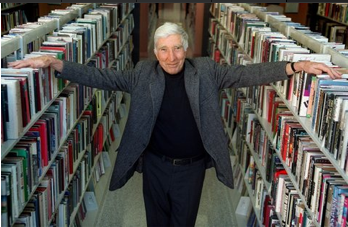In a story that appeared today, Updike biographer Adam Begley shared his picks for “Top 10 John Updike short stories” with The Guardian. Click on the link for details, but we won’t keep you in suspense for his picks:
“The Happiest I’ve Been” (1958)
“Separating” (1974)
“A&P” (1960)
“A Sandstone Farmhouse” (1990)
“The Blessed Man of Boston, My Grandmother’s Thimble, and Fanning Island” (1960)
“The Bulgarian Poetess” (1964)
“Bech in Czech” (1986)
“Problems” (1975)
“Here Come the Maples” (1976)
“My Father’s Tears” (2005)
Whether by choice or by happy accident, it’s worth noting that Begley’s list contains a story from every decade Updike worked as a professional writer.



